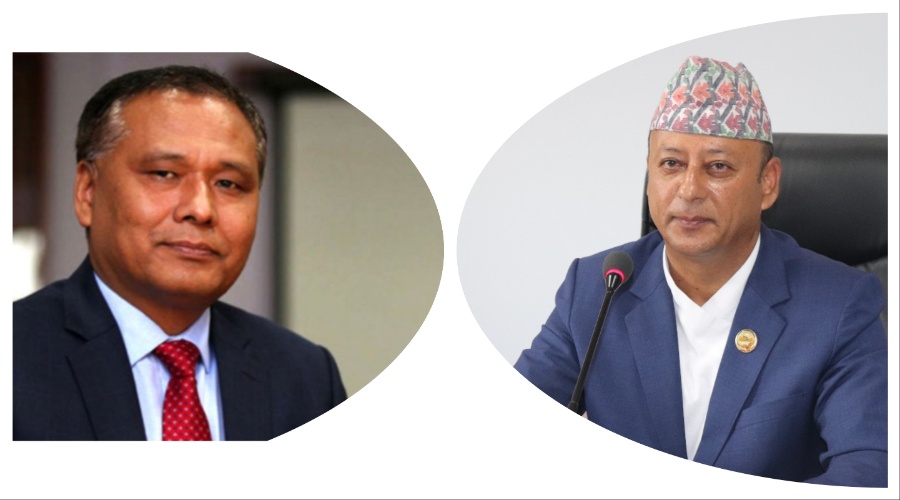KATHMANDU: Nepal Electricity Authority (NEA) Managing Director Kulman Ghising has openly challenged Energy Minister Deepak Khadka to remove him from office. Citing his exceptional performance and a valid appointment for four years by the Cabinet, Ghising firmly asserted that the minister lacks the authority to dismiss him.
The dispute emerged after Minister Khadka issued a nine-point explanation letter on January 6, questioning why Ghising’s appointment should not be terminated. The minister alleged that an inability to evaluate Ghising’s performance had created grounds for dismissal.
In his formal response, submitted on January 7, Ghising dismissed the accusations and detailed his achievements. He highlighted that his appointment was made by the Cabinet on August 10, 2021, with a fixed four-year term. He further argued that his tenure has been marked by significant institutional progress, leaving no basis for his dismissal.
Ghising pointed out that Minister Khadka’s actions are procedurally and legally flawed. “The authority to terminate my appointment lies solely with the Cabinet, not with the minister,” Ghising’s response stated.
Delays Due to Natural Disasters
Addressing allegations of delays in submitting performance reports, Ghising clarified that the delays were caused by his engagement in urgent fieldwork. Following severe floods and landslides in October, critical hydropower projects, including the Upper Tamakoshi Hydropower Project, were extensively damaged. Ghising explained that his priority was to restore these infrastructures and resume power supply across the nation.
“I had informed the Ministry earlier about the reasons for the delay and assured them that the performance report would be submitted promptly,” Ghising stated in his letter. He submitted his performance report on January 7, detailing his achievements and results.
According to the report, Ghising’s performance for fiscal years 2021/22 and 2022/23 was rated at 94.23 and 98.94 points, respectively. He claimed that the current fiscal year’s performance would achieve a score of 98.99. He argued that delays in submitting the report do not justify termination, as they were caused by extraordinary circumstances.
Restoration of Upper Tamakoshi Project
One of Ghising’s significant accomplishments during his tenure was the restoration of the Upper Tamakoshi Hydropower Project. Damaged by landslides, the project remained non-operational for 88 days. Ghising and his team worked tirelessly to bring the project back online on December 24.
The restoration of Upper Tamakoshi prevented potential nationwide load-shedding, which would have severely impacted Nepal’s economy and energy supply. Ghising emphasized that ensuring uninterrupted power supply remains his top priority.
Questioning the Legitimacy of the Investigation Committee
Ghising also raised concerns about the legitimacy of an investigation committee formed by Minister Khadka. The committee, established on November 18, was tasked with reviewing NEA operations and billing practices. Ghising argued that the committee was unauthorized and exceeded its jurisdiction.
He expressed disagreement with the Ministry’s directive requiring NEA to bear the committee’s expenses. “The committee is procedurally flawed and lacks legal standing. I cannot endorse a decision that compromises institutional integrity,” Ghising stated.
The committee’s formation followed directives from the Office of the Auditor General, Public Accounts Committee, and other regulatory bodies. They mandated NEA to recover dues from customers using dedicated and trunk power lines. Despite legal and procedural challenges, Minister Khadka formed the committee, assigning it powers to review NEA’s billing practices.
Defending Procurement Processes
Responding to allegations of irregularities in the procurement of transformers and other equipment, Ghising stated that all procedures followed prevailing laws and regulations. He assured that NEA would provide any additional documentation required for transparency.
Ghising also highlighted NEA’s efforts to recover outstanding dues from corporate customers and ensure financial accountability. “Any delays in reporting were due to urgent priorities. They cannot be used as grounds for dismissal,” he argued.
Repeated Requests for Explanation
This is not the first time Minister Khadka has sought explanations from Ghising. Since October, the Ministry has issued three explanation letters, questioning various aspects of his performance and management. Ghising has consistently defended his actions, citing his commitment to NEA’s progress and institutional integrity.
Despite these challenges, Ghising remains resolute in his stance. “My appointment was made based on merit and performance. Any attempt to undermine it would be detrimental to the institution and the nation,” he stated.
Broader Implications
The ongoing dispute between Ghising and Minister Khadka has raised concerns about governance and accountability within Nepal’s energy sector. Experts warn that political interference in NEA’s operations could have long-term consequences for the institution’s stability and performance.
As the NEA plays a critical role in Nepal’s economic development, ensuring transparent and effective leadership is paramount. The resolution of this conflict will likely set a precedent for future appointments and management practices within the energy sector.
For now, Kulman Ghising remains committed to his role, emphasizing that his focus will remain on advancing Nepal’s energy infrastructure and ensuring uninterrupted power supply for the nation.

